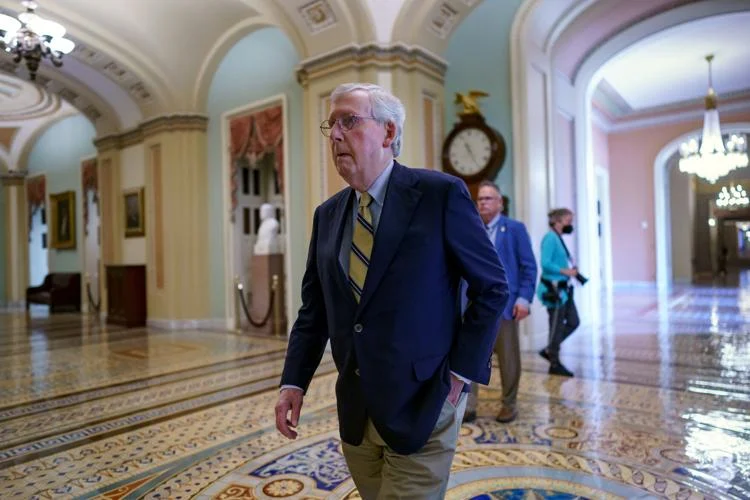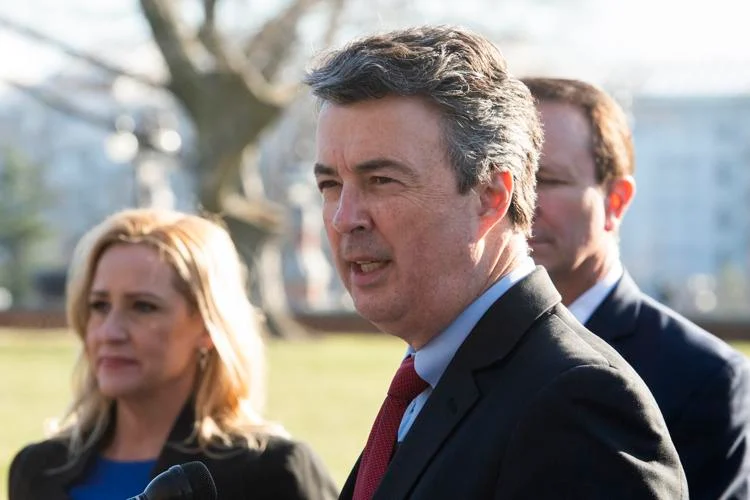Mitch McConnell freezes during news conference for second time this summer

Senate Minority Leader Mitch McConnell, R-Ky., raised fresh concerns Wednesday when he froze during a news conference, the second time he has done so this summer. McConnell, 81, appeared to struggle to hear a question from a reporter about running for reelection during a news conference in Covington, Kentucky. After the question was repeated, McConnell gave a small chuckle and then froze, looking straight ahead. An aide then stepped in and repeated the question loudly in McConnell’s ear. McConnell continued to stare ahead. The aide then told the gathering of reporters they would need a minute. After a pause, McConnell took another question about Kentucky’s attorney general, Daniel Cameron, a Republican who is running for governor. McConnell said he thought the governor’s race would be close but spoke quietly through the response before being led away from the cameras. It was the second such incident this summer. On July 26, in the middle of his remarks to the media, McConnell stared ahead and stopped talking. After an awkward pause, fellow lawmakers ushered him to his office. After that incident, McConnell returned to answer questions, telling reporters he was “fine.” McConnell suffered a fall and ensuing concussion and broken rib earlier this year. Republished with the permission of The Center Square.
AG Steve Marshall leads 21-State coalition protecting children from sex-modification procedures

On Wednesday, Alabama Attorney General Steve Marshall filed a multistate brief in the U.S. Court of Appeals for the Sixth Circuit in support of Kentucky’s and Tennessee’s bans on experimental and life-altering sex modification procedures for children. The 21-state brief is co-led by Alabama and Arkansas. The brief highlights what the AGs call the dishonesty of advocacy groups like the World Professional Association for Transgender Health (WPATH) that urge courts to defer to them on issues of pediatric sex modification. The brief argues that the Constitution gives states, not WPATH, the authority to protect children from sterilizing medical interventions pushed by LGBTQ+ groups. “In the past, federal courts have erroneously held that states have a constitutional obligation to adhere to WPATH Standards of Care,” said AG Marshall. “Let’s remember these standards say that castration is ‘medically necessary’ for a male who identifies as a ‘eunuch’ and that sterilizing sex-modification treatments for children with gender dysphoria is ‘medically necessary gender-affirming care.’ We hope the Sixth Circuit will soon make it clear that the Constitution puts states and not WPATH in charge of regulating healthcare.” The AGs state that while healthcare authorities in Europe have recently conducted systematic evidence reviews that led them to sharply curb access to sex-modification procedures for minors, the brief argues that “American medical organizations have run in the opposite direction: advocating unfettered access to transitioning treatments while quashing members’ calls to review the evidence.” The brief continues: “While medical organizations are certainly capable of establishing true, evidence-based standards of care, they have utterly failed to act responsibly when it comes to pediatric sex-modification procedures. Until they do so, states like Kentucky and Tennessee are forced to step in to protect children.” In Kentucky, Attorney General Daniel Cameron secured a legal victory on July 14, pausing the district court’s decision which had prevented enforcement of a section of Senate Bill 150. The law protects children from the irreversible effects of experimental drug treatments like puberty blockers and cross-sex hormones. SB 150 is now fully in force. “Today’s ruling is a win for parents and children,” AG Cameron said. “I’m grateful to the district court for doing what the law requires, which is protecting Kentucky kids from the irreversible harms that these experimental drug treatments would cause. Moving forward, my office will continue to defend Senate Bill 150 and stand up for the right of children to be children, free from the influences of leftist activists and radical gender ideology.” The Kentucky General Assembly passed SB 150 during the 2023 Regular Session. The legislation prioritizes the health, safety, and welfare of children and safeguards them from, among other things, irreversible medical treatments, and ideological indoctrination in schools. Democratic Governor Andy Beshear vetoed the sweeping legislation, and the General Assembly overrode his veto by overwhelming margins. Lawyers from the American Civil Liberties Union and the National Center for Lesbian Rights sued to block enforcement of a section of the law that would revoke the licenses of physicians who perform so-called “gender-affirming care” on minors. Last month, the district court ruled in their favor, prompting Attorney General Cameron to immediately seek emergency relief in both the district court and the Sixth Circuit. “By securing a stay of the district court’s injunction, Attorney General Cameron demonstrates his willingness to fight for the rule of law and the protection of Kentucky’s children,” said State Representative Jennifer Decker, who helped pass the legislation in the House. “It is well within the legislature’s power to ban the experimental use of off-label drugs that cause long-term, irreversible consequences for children, and it is fortunate that today’s ruling allows SB 150 to take effect pending the Attorney General’s appeal.” In March, WPATH stated, “Both the World Professional Association for Transgender Health (WPATH) and the US affiliate, the United States Professional Association for Transgender Health (USPATH), vehemently oppose the broad and sweeping legislation being introduced and ratified in states across the country to ban access to gender-affirming health care to transgender and gender diverse (TGD) people. WPATH’s long-standing Standards of Care for Transgender and Gender Diverse People, now in its eighth version (SOC8), explain in detail the science- and evidence-based benefits of gender-affirming care for TGD people. Any legislation that restricts or prohibits access to this care is against best practice medical standards and is condemned by WPATH and USPATH.” The Standard of Care from WPATH states, “Given the lifelong implications of medical treatment and the young age at which treatments may be started, adolescents, their parents, and care providers should be informed about the nature of the evidence base. It seems reasonable that decisions to move forward with medical and surgical treatments should be made carefully. Despite the slowly growing body of evidence supporting the effectiveness of early medical intervention, the number of studies is still low, and there are few outcome studies that follow youth into adulthood.” Attorney General Marshall co-led the brief in support of Kentucky and Tennessee with Arkansas Attorney General Tim Griffin. The brief was signed by Alabama, Arkansas, Florida, Georgia, Idaho, Indiana, Iowa, Kansas, Louisiana, Mississippi, Missouri, Montana, Nebraska, North Dakota, Ohio, Oklahoma, South Carolina, South Dakota, Texas, Utah, and West Virginia. To connect with the author of this story or to comment, email brandonmreporter@gmail.com
State AG coalition calling out Chase for religious discrimination

A group of attorneys general from across the U.S. is going after one of the country’s largest banks, which it claims treats some Christians unfairly. In a letter recently sent to JP Morgan Chase CEO Jamie Dimon, the groups said the bank preaches “openness and inclusivity,” but it has “persistently discriminated” against some religious liberty groups. “Chase cannot call itself ‘inclusive’ and say that it ‘opposes discrimination in any form’ while simultaneously disenfranchising its clients over religious and political differences,” Kentucky Attorney General Daniel Cameron, who took the lead in the effort, said. “I’m leading this coalition to stand up for Kentuckians.” In the eight-page letter, Cameron notes Chase “de-banked” the National Committee for Religious Freedom last year, with the group learning its account at a Chase branch in Washington, D.C., was canceled just a few weeks after it was created. The group said the financial institution offered to restore the account if it provided a list of donors, a list of political candidates it backed, and its rationale for endorsements. The NCRF was not alone in being excluded. Cameron also pointed to the pro-life Family Council had an account ended by a credit card processor Chase owned after it was determined to be a “high-risk” group. Meanwhile, Chase touts the scores and marks it received from groups like the Human Rights Campaign, which fights for LGBTQ+ rights. That shows a “concerning double standard,” Cameron said. “This pattern of discrimination means that many Kentuckians, and many residents of the states represented by the signatories to this letter, are at risk of being de-banked without notice or recourse,” said Cameron, a Republican who is running for the party’s gubernatorial nomination later this month. The letter calls on Chase to end discriminating against certain groups for their religious or political beliefs. One way it can show that is by participating in the National Center for Public Policy Research’s Viewpoint Diversity Score Business Index survey, which Cameron said measures “corporate respect for religious and ideological diversity.” Besides Cameron, the letter was also signed by attorneys general from Alabama, Alaska, Arkansas, Florida, Georgia, Idaho, Indiana, Iowa, Kansas, Louisiana, Mississippi, Missouri, Montana, South Carolina, Texas, Utah, Virginia, and West Virginia. Republished with the permission of The Center Square.
Steve Marshall joins AGs demanding health-care worker COVID vaccine mandate ends

Attorneys general from 22 states are urging the Biden Administration to end its mandate requiring healthcare workers to get the COVID-19 vaccine if they’re employed by operators receiving Medicare and Medicaid funding. The 37-page petition was filed Thursday under the Administrative Procedure Act. It calls on the U.S. Department for Health and Human Services and the Centers for Medicare and Medicaid Services to do away with a rule that went into effect more than a year ago. At that time, federal officials said the vaccine mandate was necessary to protect the health of workers, patients, residents, and others. However, the attorneys general say CMS exceeded its authority when it made the rule. They claim the mandate violates the spending clause of the U.S. Constitution, which threatens states from receiving essential funding if they do not comply with the rule. In Kentucky, for example, the state received more than $12 billion in Medicare and Medicaid funding from the federal government, which equals more than a quarter of the state’s budget. Further, the attorneys general argue there was no conclusive data at that time that the vaccines would prevent COVID-19 from spreading. “Indeed, fully vaccinated individuals contracted and transmitted COVID-19,” the petition states. “That trend has continued – even with the introduction of first-generation boosters and the new, bivalent Omicron booster. This data merely confirms what CMS should have known in November 2021 – full vaccination doesn’t prevent infection or transmission.” Instead, they claim the vaccines have enhanced health risks among “normally healthy” people and that mandating vaccinations has been a “flawed” policy. The petition also cites a New York state court ruling last month for 16 New York City sanitation workers who were fired because they did not get the vaccine. As a result of the vaccine mandate, Kentucky Attorney General Daniel Cameron said health-care facilities have seen massive staffing shortages that put people at risk of losing access to the care they need. “Lifting the CMS vaccine mandate would allow healthcare facilities to rehire healthcare workers who left the industry due to the mandate and alleviate the burnout so many existing healthcare workers are experiencing,” he added. Other states represented in the petition include Arizona, Alabama, Alaska, Arkansas, Florida, Indiana, Kansas, Louisiana, Mississippi, Missouri, Montana, Nebraska, New Hampshire, Ohio, Oklahoma, South Carolina, Tennessee, Texas, Utah, Virginia, and Wyoming. Republished with the permission of The Center Square.
Steve Marshall joins 22 attorneys general, file brief in federal travel mask mandate case

Attorneys general from 23 states have filed an amicus brief in a federal appeals court urging judges to uphold a ruling from earlier this year that struck down the mask mandate for interstate travel. Four months ago, Florida U.S. District Judge Kathryn Kimball Mizelle sided with the Health Freedom Defense Fund and two Florida residents. They claimed the restriction the Biden Administration announced January 29, 2021, as part of its COVID-19 guidelines exceeded federal authority. Led by Florida Attorney General Ashley Moody, the states’ attorneys general said in their 37-page filing that the U.S. Centers for Disease Control and Prevention pursued “expansive” measures in its handling of the pandemic. Officials from the states also remind the 11th Circuit Court of Appeals that federal judges set several other CDC guidelines aside. The states “share an interest in protecting their sovereign authority to enact quarantine measures of their choosing to combat the spread of disease in the manner best adapted to their distinctive local conditions – authority historically reserved to the states, as CDC’s own regulations reflect even today,” the brief states. The CDC now recommends passengers in such places as airports and airplanes wear masks, but the mandate is no longer in effect. Still, the Biden Administration has asked the circuit court to intervene. “It’s astonishing that Biden continues to fight to force mask passengers,” Moody said. “We are once again pushing back, in court, against his unlawful federal overreach.” The states also claim the mask mandate is unlawful because it goes beyond the CDC’s ability to enforce sanitation measures. They also claim the federal government failed to review what steps states were taking or determine if those measures were sufficient. Besides Florida, other attorneys general from Alabama, Alaska, Arizona, Arkansas, Georgia, Idaho, Indiana, Iowa, Kansas, Kentucky, Louisiana, Mississippi, Missouri, Montana, Nebraska, Ohio, Oklahoma, South Carolina, Texas, Utah, Virginia, and West Virginia signed on to the brief. “The district court’s ruling here correctly ended the Biden Administration’s mandate requiring all travelers to wear masks at airports, train stations, and other transportation hubs,” said Kentucky Attorney General Daniel Cameron. “We joined this brief to support the court’s important ruling and ensure this mandate is not reinstated.” Republished with the permission of The Center Square.
Kentucky abortion law blocked in win for clinics

A federal judge on Thursday temporarily blocked a state law that effectively eliminated abortions in Kentucky after the state’s two remaining clinics said they couldn’t meet its requirements. The decision by U.S. District Judge Rebecca Grady Jennings was a victory for abortion rights advocates and a setback for the Republican-led legislature, which passed the law in March and then overrode Democratic Gov. Andy Beshear’s veto of the measure last week. Both of the clinics indicated Thursday that they would immediately resume abortion services. The new law bans abortions after 15 weeks of pregnancy and requires women to be examined by a doctor before receiving abortion pills. It also contains new restrictions and reporting requirements that the Kentucky clinics said they couldn’t immediately comply with. Noncompliance can result in stiff fines, felony penalties and revocation of physician and facility licenses. Jennings’ order did not delve into the larger issue of the new law’s constitutionality. Instead, it focused on the clinics’ claims that they’re unable to immediately comply with the measure because the state hasn’t yet set up clear guidelines. The judge said her order does not prevent the state from crafting regulations. Jennings, who was appointed by former President Donald Trump, said she decided to block the measure because she lacked information “to specifically determine which individual provisions and subsections are capable of compliance.” Abortion rights activists said they were relieved by the decision but noted more rounds are ahead in the legal fight. “This is a win, but it is only the first step,” said Rebecca Gibron, the CEO for Planned Parenthood in Kentucky, where its clinic is immediately resuming abortion services. “We’re prepared to fight for our patients’ right to basic health in court and to continue doing everything in our power in ensure abortion access is permanently secured in Kentucky.” Kentucky’s Republican attorney general, Daniel Cameron, signaled that he’ll be ready to defend the law as the case proceeds. “We are disappointed that the court chose to temporarily halt enforcement of the entire law,” he said in a statement. “This law is constitutional and we look forward to continuing to defend it.” Supporters say the goal of Kentucky’s new law is to protect women’s health and strengthen oversight. Opponents say the objective all along was to stop abortions in the state completely. Abortions had been suspended at the two Louisville clinics since the law took effect last week. During that time, women in Kentucky were forced to either travel out of state to end their pregnancies or wait for the judge’s decision. Many of the women affected were young and poor, advocates said. Attorneys for the two clinics — Planned Parenthood and EMW Women’s Surgical Center — filed separate lawsuits challenging the law and seeking an order halting its enforcement. Jennings issued the order in the Planned Parenthood suit. “Abortion remains legal and is once again available in Kentucky,” said Heather Gatnarek, a staff attorney for the American Civil Liberties Union of Kentucky, which filed the suit on behalf of EMW. “We will always fight to keep it that way here and across the country.” Kentucky is among several GOP-led states that have passed restrictive abortion laws in anticipation of a U.S. Supreme Court decision that could reverse the landmark Roe v. Wade decision that established a right to abortion nationwide nearly 50 years ago. Pending before the high court is a challenge to a law passed in a fifth state, Mississippi, that bans abortion after 15 weeks. The court has indicated that it will allow Mississippi’s ban to stand and conservative justices have suggested they support overruling Roe. The Mississippi case loomed even as abortion rights supporters cheered their victory Thursday in Kentucky. “Unfortunately, the ability to receive an abortion will continue to hang by a thread throughout the United States,” Gatnarek said. “In a few weeks, the Supreme Court will decide whether to weaken or overturn Roe v. Wade.” No matter how the current conservative-dominated Supreme Court handles pending high-profile abortion cases — perhaps weakening Roe, perhaps gutting it completely — there will be no monolithic, nationwide change. Fractious state-by-state battles over abortion access will continue. Republished with the permission of the Associated Press.
Day 2 at GOP convention: a first lady, a pardon, Mike Pompeo

Trump pardoned a reformed felon, he used the White House Rose Garden to elevate his wife’s keynote address and he oversaw a naturalization ceremony for several immigrants in the midst of the prime-time program.


